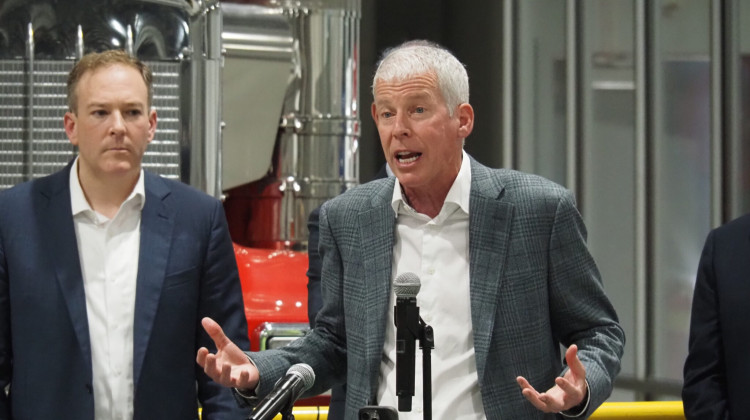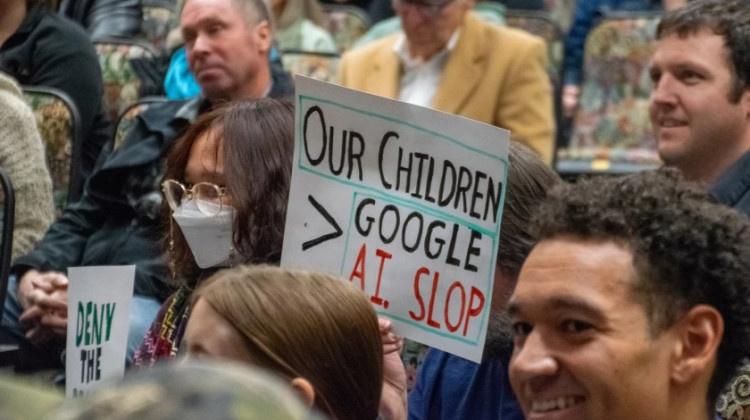
The Center for Community Justice, just outside downtown Elkhart, runs the VORP program along with others designed to facilitate restorative justice.
Jennifer Weingart/WVPE NewsCurrently, 32 states have laws that set up guidelines for victims of some crimes to meet with the offenders. The precursor to these programs was established in Elkhart County in 1977. It serves around 800 cases annually.
The program is now threatened with a funding cut.
Many of the cases that go through the program look like Robert Perry’s. Not so long ago Perry was struggling with addiction and decided to rob a store.
“I didn’t really think about it. I said ‘hey, it’s a store, they have merchandise, the merchandise is insured. I’m going to take it and supply my habit,” Perry says. “No harm, no foul.”
Perry was caught, and sentenced to Elkhart County’s Victim Offender Reconciliation Program, VORP.
“What VORP did was, it allowed me to realize there are people involved in these offenses,” he says.
Through VORP, Perry made restitution and apologized to his victims.
The History
Elkhart’s Center for Community Justice, CCJ, runs VORP, and similar programs in schools, and coaches offenders on reentering society after prison. Last June lawmakers cut its state funding.
Elkhart County funded the program this year, in a stop-gap measure through grants. That funding isn’t available again.
VORP is based on the principles of restorative justice, the idea that justice should focus on healing instead of punishment.
Restorative justice was brought to the U.S. by Howard Zehr when he learned of the program in Ontario. He brought the program to Elkhart County through his Mennonite connections, starting the first restorative justice program in the country 40 years ago.
There are around 350 VORP-like programs in the U.S., and many of them used Elkhart’s program as an example to build their own.
In Elkhart County, Randy Yohn was one of the victims in that first mediation case – at the time he was a detective for the county sheriff.
“Part of the stuff that he took was sheriff’s department equipment, so being a detective we kind of zeroed in on him but it took a while to catch him,” Yohn says. “When he was caught he was placed in jail and he had been asked, or told, to participate in a new program.”
In that first case the offender committed a string of robberies. He was a Vietnam veteran, unemployed, struggling with drugs and alcohol, and trying to support his wife and daughter.
He was supposed to go to prison for 10 to 20 years under state mandatory sentencing laws. The judge thought prison would ruin his life, and his family’s, and decided to put him in VORP instead.
A Case Of Addiction And Forgiveness
Over the next 40 years VORP would mediate with thousands of cases.
Ben Manderfeld was an offender in one of those cases recently. He fell in love with someone who was in love with heroin.
“No one decides one day, ‘oh, I’m going to be a heroin addict and it’s going to be fine.’ It was because I met someone,” he says. “I quickly found myself dealing with something I didn’t understand.”
They started stealing from stores to pay for the drugs. Manderfeld was running away from security officers through a Walmart parking lot when he knocked a mirror off a car.
He was sentenced to jail time for the theft and put in VORP to make restitution for the car he damaged.
“It turns out that individual had quite a lot of experience with addiction, the same type of it, and was dealing with it at that time with a family member,” Manderfeld says.
Manderfeld says understanding his victim had – for his situation – helped him heal.
Finding The Money
Connie Caiceros, the director of CCJ, says they’re looking for donors and grants to fill in the lost funds.
“To lose that, there’s not just any systematic way for people to even think like that,” Caiceros says. “We’re not socialized to think ‘who have I harmed, how can I make that right?’ Instead, it’s like you’ve done wrong and you’re going to be punished now and a fear of punishment and an avoidance of punishment instead of a focus on healing.”
If they can’t get alternative funding the program won’t disappear. There is some funding from other sources, but it would have to limit the number of cases it can take, down more than 80 percent, to as few as 125 cases a year.
Caiseros and supporters say this will burden the justice system and the taxpayers – offenders that go through VORP commit new crimes about half as often as offenders who just go to jail.
“If I don’t use VORP then I have to use my probation department,” says Steven Bowers, Elkhart County Superior Court judge. He regularly places offenders with VORP. “And the probation department is already burdened with other things that it’s responsible to do. So there’s not another resource readily available to address those needs.”
Looking Ahead
Ben Manderfeld can attest to the lack of available resources. After being released from prison, he relapsed. He now is part of an out-patient rehabilitation program and sober living community in Indianapolis.
He says the program he found is one of the only like it in the state. The short detox programs he participated in around South Bend never worked long term for him.
He’s using the skills he learned in VORP to make amends.
“It went a lot better than I had anticipated, and it was very theraputic, actually, to say I’m sorry and just explain,” Manderfeld says. “Making amends with people you have wronged, it’s a very powerful thing. I don’t think people realize how heavily that weighs on your heart.”
Manderfeld has been sober since the end of February. He plans on finishing his degree and getting his masters to council addicts. He’s also working on a book about his experiences.
Robert Perry is now a graduate of Indiana University-South Bend with a degree in social work. As part of his degree, he worked as an intern for the Center for Community Justice.
“When I met with Connie she was like ‘There’s so much going on here, this will just give you a taste of a lot of different things.’ But I believe in restorative justice, and I believe in what it does to build people,” Perry says.
Perry says he wants to work in schools teaching kids about restorative justice, or with people recently released from prison to work on re-entry into society.
 DONATE
DONATE






 View More Articles
View More Articles



 Support WFYI. We can't do it without you.
Support WFYI. We can't do it without you.